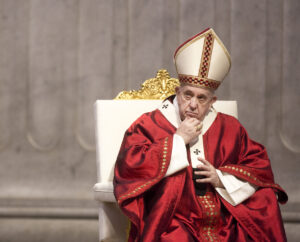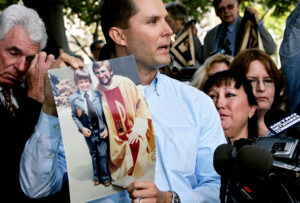It’s the eyes — swollen, dark and merciless — that everyone notices. They stare out from the mosaic walls of some of the most beloved shrines in the Catholic World, including Lourdes, Fatima and St Padre Pio.
They’ve been called “Roswell eyes” because they remind people of alien-abduction art. For decades, visitors to these holy places wondered why the artist — a vastly well-connected Slovenian Jesuit called Fr Marko Rupnik — was commissioned to push them into the faces of the Blessed Virgin Mary and Christ himself.
Now unease has turned to revulsion. Rupnik, 68, has been credibly accused of truly grotesque sex abuse. Religious sisters who belonged to a community he founded in the Eighties claim they endured assaults so disgusting that The Pillar, a major Catholic news outlet, printed the story under the heading: “WARNING. Graphic and disturbing content.”
In December 2022 it was revealed that Rupnik had been excommunicated for abusing the confessional to absolve a woman from the sin of having sex with him. The Jesuits, after investigating what it called “gruesome” allegations made by other sisters he recruited — nuns in all but name — expelled him from their order.
But that was just the beginning of the public scandal. Today it threatens to engulf the Pope himself. As he prepares to preside over a synod of bishops and lay activists that is pledged to raise the profile of women in the Church, Francis is being accused of extending his personal protection to a sadistic clerical abuser of women.
The timeline explains why this week the 86-year-old pontiff finds himself in such a desperate position.
In October 2018, Rupnik was reported to Rome for absolving his sexual partner in confession. In May 2020, he was excommunicated. Incredibly, in the middle of the excommunication proceedings Rupnik preached a Lenten Retreat in the Pope’s Apostolic Palace. Then his excommunication was lifted within a month of being declared, because he had “repented”.
In early December 2022, Italian blogs revealed that, as long ago as the Nineties, sisters belonging to Rupnik’s Loyola Community in Slovenia accused him of abuse. The Jesuit order was forced to admit that in 2021 it passed these allegations to the Dicastery for the Doctrine of the Faith, formerly the Inquisition, which polices doctrine and sexual morality. The DDF refused to lift the statute of limitations that would allow it to prosecute Rupnik for the alleged abuse. Yet it could easily have done so, if Francis had agreed.
On 18 December 2022, one of Rupnik’s alleged victims, a 58-year-old former Loyola sister identified as “Anna”, went public with her “graphic and disturbing content”. She claimed her abuse began with the priest kissing her on the mouth, “telling me that this was how he kissed the altar where he celebrated the Eucharist”.
Later, she claimed, “he became more aggressive: I remember a very violent masturbation … during which I lost my virginity, an episode that initiated pressing requests for oral intercourse.” By the early Nineties, according to Anna, Fr Rupnik had abused 20 sisters.
Significantly, Anna claimed that the abuse continued at Rupnik’s new studio in Rome, the Aletti Centre, where his creepy mosaics are produced. She told the Italian newspaper Domani: “There Father Marko asked me to have threesomes with another sister of the community, because sexuality had to be, in his opinion, free from possession, in the image of the Trinity…” She also revealed that in December 2021 she and other alleged women victims submitted their testimony to the DDF. She heard nothing more from the Vatican.
The Jesuit order expelled Rupnik in June this year, having judged “the degree of credibility of what was reported or testified to be very high”. This was after decades of ignoring the scandal.
The Pope, meanwhile, gave an interview in January in which he simultaneously claimed that he made a procedural decision about the Rupnik allegations, but that “I had nothing to do with this” (ie, the Rupnik case). The respected Vatican correspondent Christopher Altieri pointed out in Catholic World Report that these statements couldn’t both be true. He said “senior churchmen close to Francis have strongly suggested that Francis had pretty much everything to do with the management of it”.
In the past few months, anxiety in Rome about what the Pope knew has been kept in check by liberal members of the Vatican press corps, who refuse to ask awkward questions lest the answers disrupt the synod. But last week their strategy fell apart when the Diocese of Rome issued a statement on its investigation into the Aletti Centre, the alleged scene of revolting abuse.
To quote Ed Condon, Editor of The Pillar, the statement congratulated the centre on “maintaining a ‘healthy community life without any particular critical issues’ and praised its members for ‘maintaining silence’ about the scores of accusations that Rupnik spiritually and sexually abused women, including through overtly sacrilegious sexual acts”. Bizarrely, it also suggested (but without explaining why) that Rupnik shouldn’t have been excommunicated for the offence of which he was found guilty, a diabolical abuse of the confessional.
This defies belief, and Condon — always loyal to the Pope — for the first time confronted the possibility that Francis was subverting the Church’s investigations “on behalf of a man accused of arguably more appalling crimes, by far more people, than some of the most notorious names in the canon of disgraced churchmen”. Five alleged victims of Rupnik responded furiously to the Diocese of Rome’s statement, saying it “ridiculed” their pain.
In addition, the Left-wing editor of La Croix, Robert Mickens, upbraided liberal hacks on the papal plane back from Marseilles on Friday for failing to ask Francis “THE most important question of his pontificate”, Given Mickens’s enthusiasm for the Pope’s most provocative moves against conservatives, that’s an extraordinary turn of phrase.
Are we finally witnessing a long-delayed joining of the dots? On at least two occasions in the past, Francis has inexplicably (and unsuccessfully) tried to shield abuser allies from justice. Before becoming Pope he commissioned a report whose aim was to keep the Argentine child abuser Fr Julio Grassi out of jail; he also tried to protect the Argentine predator Bishop Gustavo Zanchetta by parachuting him into a senior job in Vatican finances, and refused to supply documents demanded by the Argentine court that eventually sentenced Zanchetta to jail. There have been other disturbing episodes.
Four years ago, a senior figure in Rome told me he couldn’t explain why the Pope should take such insane risks on behalf of criminals — unless not doing so, for some reason, was an even bigger risk. But he had no evidence, of course, and such is the power of the supreme pontiff that crucial information will be locked away while Francis is alive. There’s very little chance that he’ll resign, and one of the quirks of Catholic canon law is that, if a pontiff announces his resignation in response to any pressure, including a scandal, then his resignation is automatically invalid. But a word I keep hearing now is the Cold War term Kompromat. It’s beginning to look as if, despite Francis’s attempts to distract everyone with the synod, Rupnik and his bug-eyed mosaics have already killed off this pontificate.
Disclaimer
Some of the posts we share are controversial and we do not necessarily agree with them in the whole extend. Sometimes we agree with the content or part of it but we do not agree with the narration or language. Nevertheless we find them somehow interesting, valuable and/or informative or we share them, because we strongly believe in freedom of speech, free press and journalism. We strongly encourage you to have a critical approach to all the content, do your own research and analysis to build your own opinion.
We would be glad to have your feedback.
Source: UnHerd Read the original article here: https://unherd.com/



